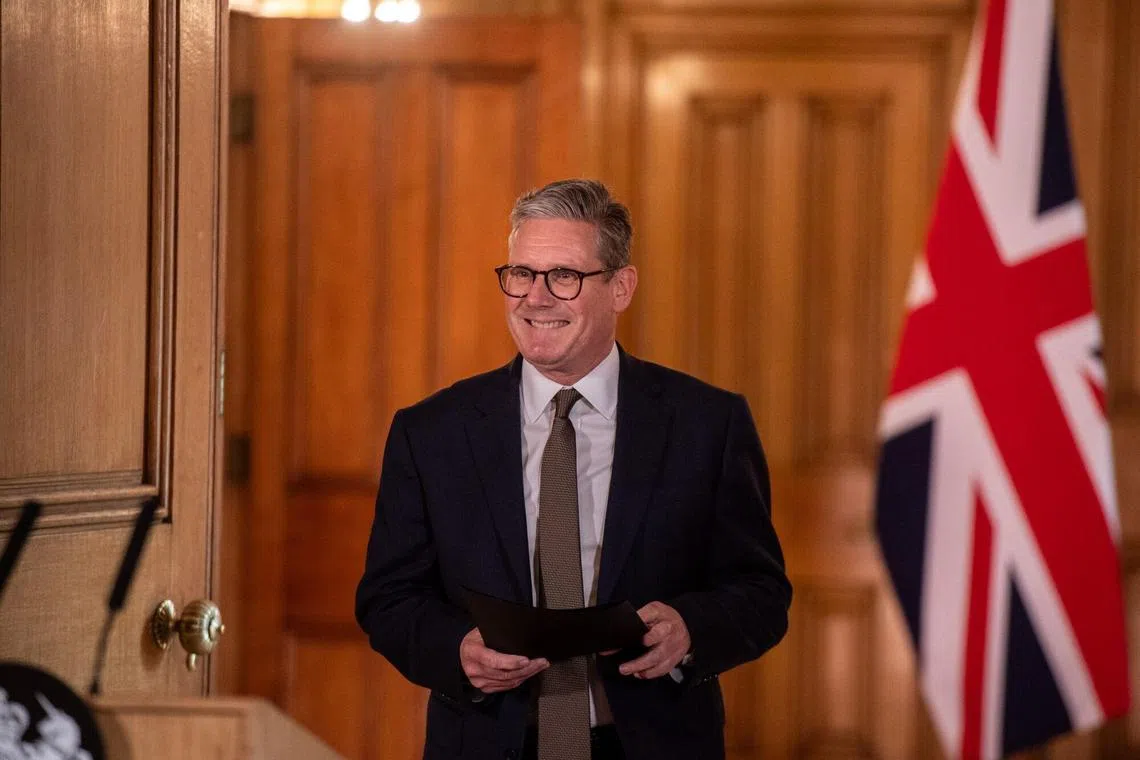New UK PM Starmer ‘restless for change’ after huge election win
Sign up now: Get ST's newsletters delivered to your inbox

Newly elected British Prime Minister Keir Starmer spent his first hours in Downing Street on July 6 appointing his ministerial team.
PHOTO: BLOOMBERG
LONDON – Britain’s newly elected Prime Minister Keir Starmer on July 6 began his first full day in charge declaring the ousted Tories’ plan to deport migrants to Rwanda “dead and buried” and pledging growth as his government’s “No.1 mission”.
The Labour leader, who won the July 4 election by a landslide – bringing to a close 14 years of Conservative rule – said he was “restless for change” and that his party had received a “mandate to do politics differently”.
Mr Starmer started the day with a first meeting of his Cabinet, which included Britain’s first woman finance minister Rachel Reeves and new foreign minister David Lammy.
“We have a huge amount of work to do, so now we get on with our work,” he told his top team to applause and smiles around the Cabinet table at 10 Downing Street.
At a news conference later, he said he would not be proceeding with former Conservative prime minister Rishi Sunak’s controversial scheme to tackle rising small boat arrivals on England’s southern coast by deporting migrants to Rwanda.
“The Rwanda scheme was dead and buried before it started... I’m not prepared to continue with gimmicks that don’t act as a deterrent,” he said.
‘Driving growth’
Mr Starmer spent his first hours in Downing Street on July 5 appointing his ministerial team, hours after securing his centre-left party’s return to power with a whopping 174-seat majority in the British Parliament.
Notable lower-ranking appointments included Dr Patrick Vallance, chief scientific government adviser during the Covid-19 pandemic, who was made a science minister.
Mr James Timpson, whose shoe repair company employs former offenders, was made a prisons minister.
Mr Starmer said both new ministers were people “associated with change” and illustrated his determination to deliver concrete improvements to people’s lives.
Work on “driving growth” had already begun, he said, adding that he had told his ministers “exactly what I expect of them in terms of standards, delivery and the trust that the country has put in them”.
Nato support ‘unshakable’
Flag-waving crowds of cheering Labour activists on July 5 welcomed Mr Starmer to Downing Street hours after his victory.
But daunting challenges await his government, including a stagnating economy, creaking public services and households suffering from a years-long cost-of-living crisis.
World leaders lined up to congratulate the new British leader.
Mr Starmer spoke by telephone with US President Joe Biden and “discussed their shared commitment to the special relationship between the UK and US and their aligned ambitions for greater economic growth”, according to London.
He also spoke to European Commission president Ursula von der Leyen, Ukrainian President Volodymyr Zelensky and Indian Prime Minister Narendra Modi.
But former – and potentially future – US president Donald Trump ignored Mr Starmer, instead hailing the electoral breakthrough of his ally Nigel Farage’s far-right Reform UK party.
Mr Starmer will make his debut on the international stage as leader when he flies to Washington next week for a Nato summit.
“It is for me to be absolutely clear that the first duty of my government is security and defence, to make clear our unshakable support of Nato,” he said.
He added that he had reiterated to Mr Zelensky the support of Britain and its allies.
Infighting fears
The election saw Labour near its record of 418 seats under former leader Tony Blair in 1997 by winning 412.
The Conservatives suffered their worst-ever defeat, capturing just 121 constituencies, prompting Mr Sunak to apologise to the nation and confirm that he will resign as party leader once arrangements are in place to select a successor.
A record 12 senior former government ministers lost their seats, alongside former prime minister Liz Truss whose economically calamitous short-lived tenure in 2022 wounded the party irreparably ahead of the election.
It is now poised for another period of infighting between a moderate wing eager for a centrist leader and those who may even be willing to court Mr Farage as a new figurehead.
The election also saw the centrist Liberal Democrats make their biggest gains in around a century, claiming more than 70 seats to become the third-largest party in Parliament.
But it was a dismal contest for the pro-independence Scottish National Party, which was virtually obliterated in Scotland. It dropped from 48 seats to just nine, with one still to declare early on June 6.
The Green Party had its best general election, quadrupling its MP count to four.
Meanwhile, an unprecedented six independent lawmakers were elected – four of them defeating Labour candidates in districts with large Muslim populations where election campaigns centred around the Israel-Hamas conflict in Gaza. AFP


